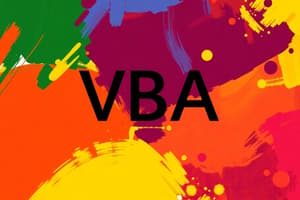Podcast
Questions and Answers
What is the main purpose of Visual Basic for Applications (VBA)?
What is the main purpose of Visual Basic for Applications (VBA)?
- To create standalone programs
- To automate processes and access low-level functionality (correct)
- To develop mobile applications
- To build web applications
Which programming language is VBA based on?
Which programming language is VBA based on?
- Visual Basic 6.0 (correct)
- Visual Basic .NET
- Java
- C++
What does VBA stand for?
What does VBA stand for?
- Visual Basic for Automation
- Virtual Basic Application
- Visual Basic for Applications (correct)
- Virtual Business Application
Which of the following is NOT a feature of VBA?
Which of the following is NOT a feature of VBA?
In what kind of programs can VBA code normally run?
In what kind of programs can VBA code normally run?
What is the intermediate language used to compile code written in VBA?
What is the intermediate language used to compile code written in VBA?
Which version of Microsoft Office for Mac OS X does not include VBA?
Which version of Microsoft Office for Mac OS X does not include VBA?
In which application can VBA use, but not create, ActiveX/COM DLLs?
In which application can VBA use, but not create, ActiveX/COM DLLs?
Which version of Visual Basic is incompatible with VBA?
Which version of Visual Basic is incompatible with VBA?
How does VBA interact with the host application?
How does VBA interact with the host application?
Flashcards are hidden until you start studying
Study Notes
Visual Basic for Applications (VBA) Overview
- VBA is primarily used for automating tasks in Microsoft Office applications and enhancing their functionality.
- It enables users to create custom functions, automate repetitive tasks, and control other applications through the Office suite.
Programming Language Basis
- VBA is based on the Visual Basic programming language, which is known for its user-friendly syntax and integration with Microsoft products.
Meaning of VBA
- VBA stands for Visual Basic for Applications, highlighting its focus on application-specific programming.
Features of VBA
- Features include integration with Excel, Word, and Access, support for event-driven programming, and the ability to manipulate user forms.
- Notable limitations of VBA exclude certain advanced programming constructs found in full-fledged programming languages.
Compatibility with Programs
- VBA code can run in various Microsoft Office applications such as Excel, Word, PowerPoint, and Access, among others.
Intermediate Language for Compilation
- The intermediate language used to compile VBA code is known as p-code, which enables execution within the host applications.
Microsoft Office for Mac OS X Versions
- Microsoft Office for Mac versions prior to 2016 do not include VBA support, limiting automation capabilities in those releases.
ActiveX/COM DLLs
- In the Microsoft Word application, users can utilize VBA to interact with ActiveX/COM DLLs but cannot create them within Word.
Visual Basic Incompatibility
- Visual Basic .NET (VB.NET) is incompatible with VBA due to significant differences in structure, syntax, and runtime environment.
Interaction with Host Applications
- VBA interacts directly with the host application's object model, allowing users to control application features and manipulate data seamlessly.
Studying That Suits You
Use AI to generate personalized quizzes and flashcards to suit your learning preferences.




